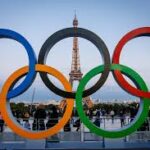Paralympics: Navigating Hurdles, Embracing Wins- Sam B, Femi S and Charlie L
” A record number of broadcasters from around the world are set to cover the Paris 2024 Paralympic Games.”
Another cycle of Major sporting events arrived this summer and you had to be living under a rock to miss them, with great titles such as, The Euros, The Olympics and, with an increased popularity, The Paralympics. But what has caused this spike in interest in The Paralympic games, with not only an increase in interest on TV but also an increase on many social media platforms.
The event ran from the 28th of august to the 8th of September hitting a record 20 million viewers on Channel 4 alone. However, this increase in interest with disabled sports and The Paralympic games had been set in motion months before. At the dawn of the last paralympic cycle beforehand, that was unfortunately postponed in 2020, the paralympic committee introduced a new social media initiative, across twitter, TikTok and Instagram. The form of content to some however was received with controversy, interestingly it was received well with most disabled athletes, it took the form of humorous and engaging content while some felt it should have been more informative.
Brad Snyder, a blind triathlon athlete thought the pages were “brilliant” saying that “people are taking a look at the Paralympics specifically and now are interested in engaging with something that has really struggled to find a major footing around the world.” Presently we can see the positive effects of this with these views on social media platforms transferring to an increase in views of The Games. This has allowed for some athletes to have a foot in the door to speak on issues surrounding disability in general. Many of the team GB Paralympians have begun to launch the Equal Play Campaign; calling the government to ensure “every child has the same access to PE at school “
For Team GB, the Paralympics has opened exciting opportunities, especially for the many veterans on the team. Through brand endorsements and sports sponsorships, athletes are proving that they can earn through their sport at the highest levels. This success challenges harmful stereotypes that some people still hold about disabled athletes being “benefit leachers.”

By competing at this level, Paralympians are showing that, just like anyone else, disabled people have dreams, goals, and the determination to achieve them. Their achievements inspire us all and help break down barriers, proving that disability is not a limitation to success. However, through this engagement, have there been drawbacks to the progression of views around disabled people?
With a rise in viewership for the Paralympics, an increase in ethical issues is also becoming prominent.
Firstly, the games have caused an increase in controversy about the disabled, with the opinion that a disabled person cannot just live an ordinary life; they must either rely on the benefit system or take part in the Paralympics. This sets unrealistic expectations for disabled people worldwide and is often pressured from incredibly young ages.
Also, having the Paralympics held separately for the Olympics emphasises the split between the “real” Olympic Games and the Paralympics. Leading to many people wanting the games to run side by side or even join and become one.
Next, I am sure you have all seen the infamous Paralympics TikTok account which has now reached 4.7 million followers. This account has caused mass separation amongst people as many have said they find it offensive. With the most controversial video being one with background noises from ‘Bop-It!’ Playing as blind and vision impaired swimmers get tapped on the head with foam poles. Many believed that the videos were mocking and downplaying their accomplishments, describing the videos as ‘disrespectful,’ ‘evil’ and ‘gross.’
We obviously cannot finish without a mention of the closing ceremony; France did not disappoint with the celebrations, including fireworks and performances from 23 artists – even the athletes got in the act with a huge farewell conga, which added to the overall elation of the event.
GB took home an impressive 49 golds, losing out to China’s stellar athletes by just a mere… 45 medals (2028 will be different… Hopefully!)
Reflecting on the Games, they ultimately underscore the need to further the inclusion of disabled people, not just within our sporting community, but in within workplaces and even in schools.














Post Comment
You must be logged in to post a comment.